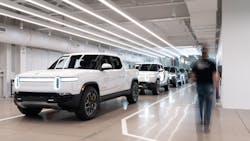EV Notes: Rivian Beats Lowered Production Goal
With the holiday season firmly in the rearview, it’s time to jump back into the hustle and bustle of the world of electric vehicles. As a jumping-off point, we’ve collected some of the most interesting stories from the sector you may have missed over the past month, including some updates from past stories.
While the companies featured vary, one theme stands out: batteries. From manufacturing plant expansion to a battery that could revolutionize eVTOL ranges, batteries seem to continue to be top of mind for those working on the next phase of EVs.
Rivian resolves production problems
In the last EV Notes, we led with news that Rivian Automotive’s leaders had cut their production targets due to a parts shortage that began in Q3. The component was a shared part between its R1 SUV, R1T pick-up, and delivery vans. According to a release on Jan. 5, the shortage is no longer affecting production.
Some good news that came alongside that announcement was that Rivian exceeded its revised yearly production goal in 2024. The company ended Q4 with 49,476 vehicles produced, topping the 47,000-to-49,000 range executives had set after reporting the parts shortage. Rivian began 2024 with a production goal of 57,000 vehicles.
Deliveries also were near the lowered guidance at 51,579 versus the stated range of 50,500 to 52,000.
Rivian executives plan to release its 2024 fourth-quarter and full year results on Feb. 20.
Mullen seeks $55M from DOE
Mullen Automotive recently submitted a modified plan to the Department of Energy in a bid to win $55 million under the Battery Materials Processing and Battery Manufacturing Program. That program was first established in November 2023 under the Bipartisan Infrastructure Law and was funded with $3.5 billion to “boost domestic production of advanced batteries and battery materials nationwide.”
If approved, the $55 million would be a matching grant to Mullen’s own current and planned investments. So far, the company has spent $12 million to buy assets from battery pack companies such as Romeo Power as well as fellow automotive manufacturer Nikola Motors. Leaders plan to invest another $43 million “in support of U.S. production” according to the release.
Mullen already has facilities in Mishawaka, Indiana, and Fullerton, California, dedicated to EV battery production. The Fullerton facility focuses on research and development as well as prototype production; executives have also floated the idea of adding a low-voltage line.
The Mishawaka plant is where the heart of production lies: The former General Motors Hummer and AM General manufacturing facility is undergoing renovations to accommodate a capacity of 1 gigawatt-hour per year. The first production units from the plant are planned for delivery later this year, with two more lines scheduled to launch in 2026 and 2027.
EVgo receives first of $1.25B DOE loan funds
In another update from our last roundup, EVgo Inc. has completed its first drawdown of $75 million from its DOE-guaranteed $1.25 billion loan. EVgo executives first announced they had received conditional commitment for the loan last October before being approved and reaching financial close in December after an 18-month process.
The full loan contains $1.05 billion in principal and $193 million in capitalized interest. It comes from the agency’s Title 17 Clean Energy Financing Program. Part of the guarantee requires EVgo to build 7,500 fast charging stalls nationwide by 2030, tripling the size of its network from today. At least 40% of the new stalls will be built in “marginalized areas” overburdened by environmental impacts, in accordance with the Biden-Harris Administration’s Justice40 Initiative.
NEO Battery targets new sectors
Silicon anode developer NEO Battery Materials signed a Joint Development Agreement (JDA) with an unnamed North American battery cell company. Under the deal’s terms, NEO will supply its anodes for use in its partner’s lithium-ion batteries, which will power “specialty electric automotive and mobility applications.”
Also on the subject of specialty applications, NEO announced Jan. 7 that it had launched a new product, NBMSiDE® P-300, with the aim of breaking into the electric vertical takeoff and landing (eVTOL) space, where solid-state batteries are preferred for their thermal stability, safety, and high energy density.
The P-300 is designed to improve battery capacity and efficiency; it can reach up to 800 mAh/g capacity, 130% higher than graphite anodes.
Spencer Huh, president and CEO of NEO, said the company is “committed” to diversifying its technology’s applications in 2025 and highlighted the potential of the space and eVTOL sectors.
“By targeting these transformative industries, alongside our existing focus on electric vehicles, NEO aims to position itself at the forefront of innovation, addressing critical challenges and advancing energy storage technology to support the next generation of transportation and aerospace applications," he said.
New Lucid SUV to be powered by Panasonic
The Grand Touring trim of Lucid Group’s upcoming Gravity SUV will be powered by Panasonic Energy’s lithium-ion Panasonic 2170 batteries, the company announced Jan. 6. The cells have an estimated range of 450 miles while having a smaller battery pack.
The offering is a result of the companies’ 2022 multi-year battery supply agreement. Panasonic batteries were also featured in Lucid’s Air Pure sedan. According to the release, the Gravity will be the first to leverage the new technology at scale, as it was specifically designed to meet Lucid's “exceptional” standards around charging, performance, and safety.
Lucid’s Gravity Grand Touring entered production last month and starts at $94,900. The lower-trim Gravity Touring, starting at $79,900, is also slated to use the Panasonic 2170 batteries when it starts production late this year.
The cells are produced in Japan but production is expected to move to Panasonic’s new, 300-acre facility in Kansas when that plant opens this spring. As of 2023, Panasonic Energy has supplied roughly 15 billion lithium-ion EV batteries worldwide.
